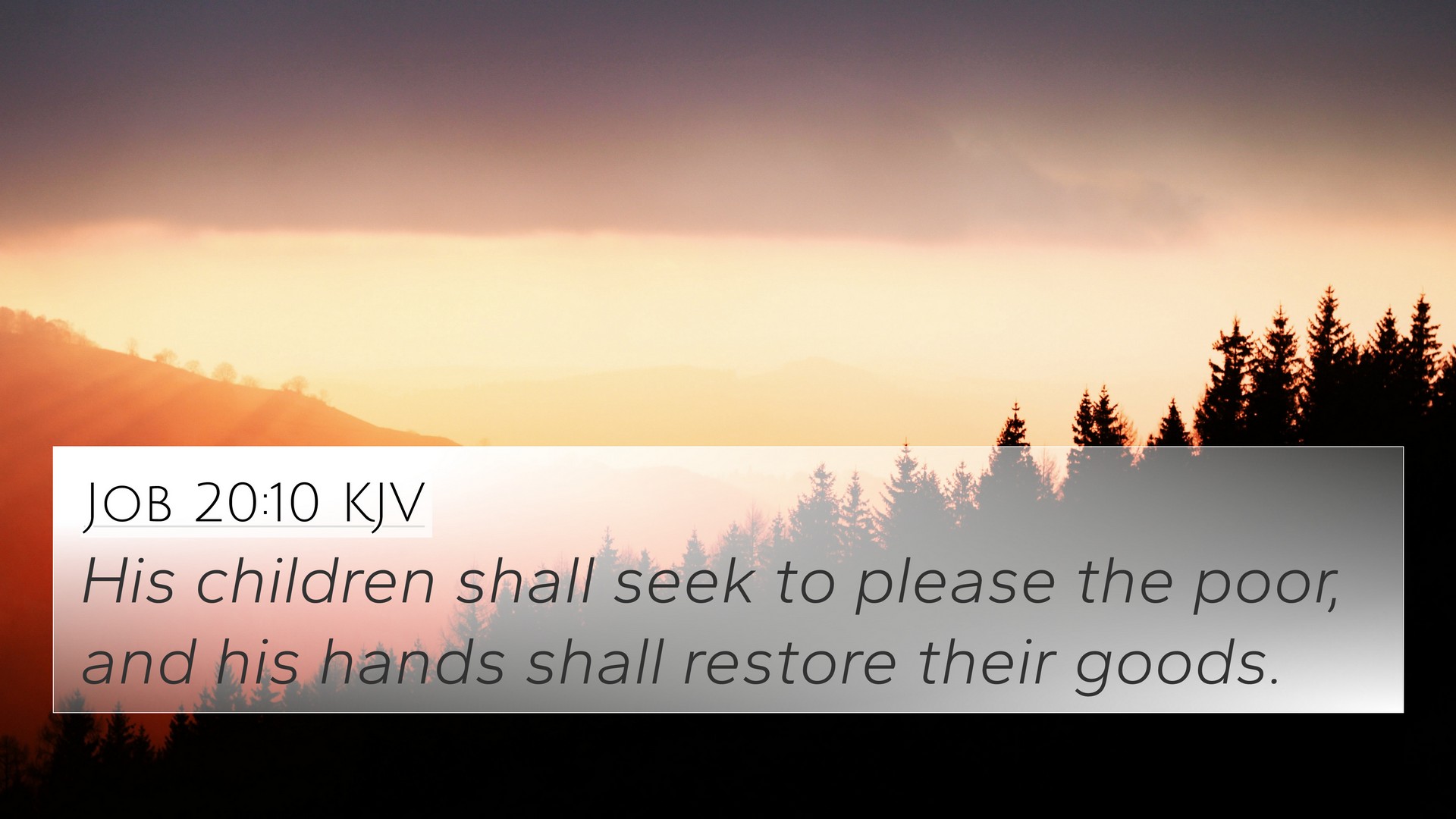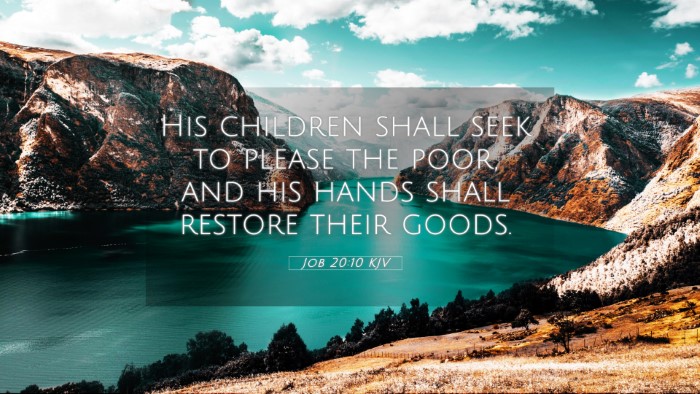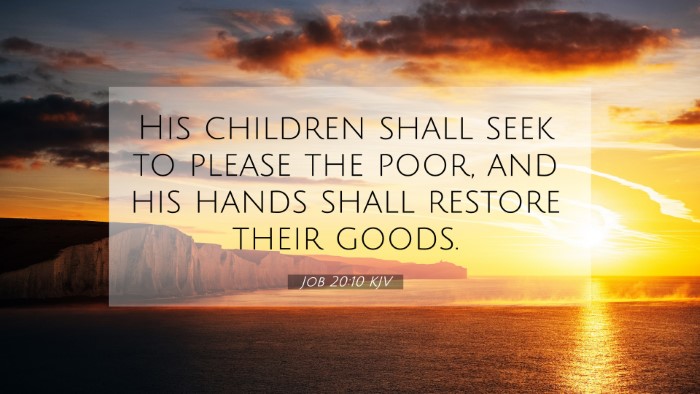Old Testament
Genesis Exodus Leviticus Numbers Deuteronomy Joshua Judges Ruth 1 Samuel 2 Samuel 1 Kings 2 Kings 1 Chronicles 2 Chronicles Ezra Nehemiah Esther Job Psalms Proverbs Ecclesiastes Song of Solomon Isaiah Jeremiah Lamentations Ezekiel Daniel Hosea Joel Amos Obadiah Jonah Micah Nahum Habakkuk Zephaniah Haggai Zechariah MalachiJob 20:10 Similar Verses
Job 20:10 Cross References
His children shall seek to please the poor, and his hands shall restore their goods.
Uncover the Rich Themes and Topics of This Bible Verse
Listed below are the Bible themes associated with Job 20:10. We invite you to explore each theme to gain deeper insights into the Scriptures.
Job 20:10 Cross Reference Verses
This section features a detailed cross-reference designed to enrich your understanding of the Scriptures. Below, you will find carefully selected verses that echo the themes and teachings related to Job 20:10 KJV. Click on any image to explore detailed analyses of related Bible verses and uncover deeper theological insights.

Job 20:18 (KJV) »
That which he laboured for shall he restore, and shall not swallow it down: according to his substance shall the restitution be, and he shall not rejoice therein.

Luke 19:8 (KJV) »
And Zacchaeus stood, and said unto the Lord: Behold, Lord, the half of my goods I give to the poor; and if I have taken any thing from any man by false accusation, I restore him fourfold.
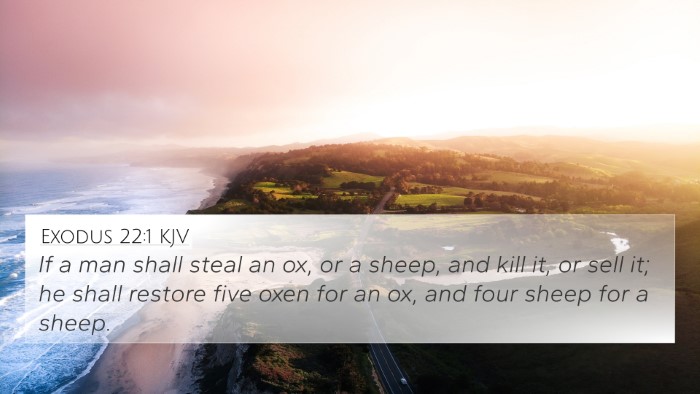
Exodus 22:1 (KJV) »
If a man shall steal an ox, or a sheep, and kill it, or sell it; he shall restore five oxen for an ox, and four sheep for a sheep.
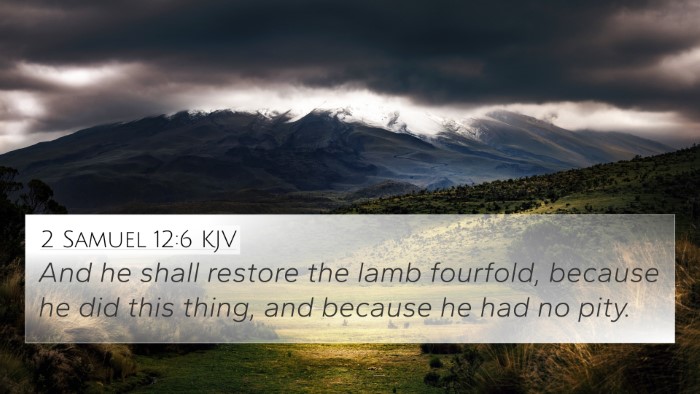
2 Samuel 12:6 (KJV) »
And he shall restore the lamb fourfold, because he did this thing, and because he had no pity.

Job 5:4 (KJV) »
His children are far from safety, and they are crushed in the gate, neither is there any to deliver them.
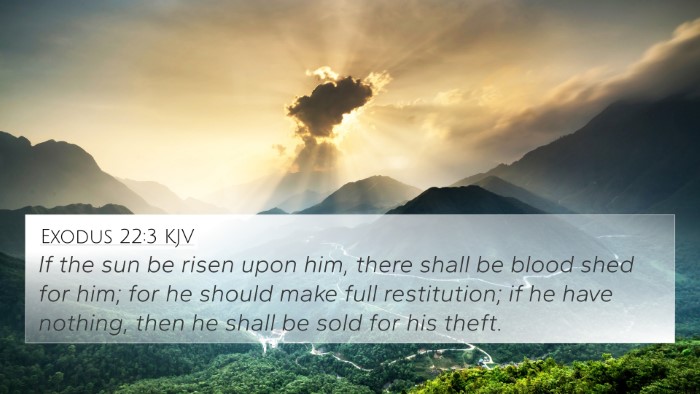
Exodus 22:3 (KJV) »
If the sun be risen upon him, there shall be blood shed for him; for he should make full restitution; if he have nothing, then he shall be sold for his theft.

Psalms 109:10 (KJV) »
Let his children be continually vagabonds, and beg: let them seek their bread also out of their desolate places.

Proverbs 6:31 (KJV) »
But if he be found, he shall restore sevenfold; he shall give all the substance of his house.
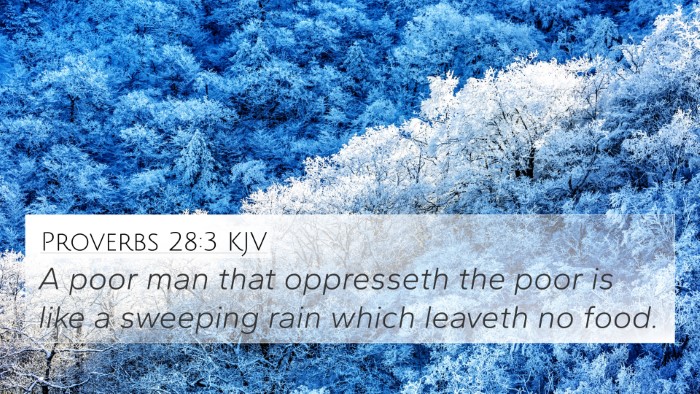
Proverbs 28:3 (KJV) »
A poor man that oppresseth the poor is like a sweeping rain which leaveth no food.

Exodus 12:36 (KJV) »
And the LORD gave the people favor in the sight of the Egyptians, so that they lent unto them such things as they required. And they spoiled the Egyptians.
Job 20:10 Verse Analysis and Similar Verses
Understanding Job 20:10
Job 20:10 speaks to the broader themes of retribution and consequence within the Biblical narrative. This verse states, "His children shall seek to please the poor, and his hands shall restore their goods." This insight highlights the profound moral complexities and the divine justice evident in the life and trials of Job. Various commentaries provide illumination on its deeper meanings and connections to other scriptural texts.
Summary of Commentary Insights
The commentaries from Matthew Henry, Albert Barnes, and Adam Clarke analyze Job 20:10 in light of the suffering and eventual restoration of the righteous. Job's friends believed that suffering indicated divine disfavor, while Job maintained his innocence, providing a backdrop for profound discussions on justice and morality.
-
Matthew Henry:
In his commentary, Henry emphasizes the theme of divine justice, indicating that the suffering of the wicked ultimately leads to righteous living among their descendants. He asserts that the experience of loss may compel the wicked's children to embody compassion, thereby acknowledging their parents' errors.
-
Albert Barnes:
Barnes connects this verse to the moral implications of wealth and its transient nature, indicating that the righteous will often benefit from the downfall of the unrighteous. He interprets the actions of the wicked's children as a reflection of divine principles—recognizing that often they will seek redemption through acts of kindness to the less fortunate.
-
Adam Clarke:
Clarke provides a linguistic analysis, expressing that the restoration mentioned in the verse symbolizes a possibility of repentance and renewal for the wicked's offspring. He argues that understanding this verse requires recognizing the cyclical nature of sin and redemption within human interactions and divine justice.
Connections and Cross-References
Job 20:10 provides opportunities for cross-referencing within the Bible, which elucidates its meaning and enhances understanding through connections with other scripture. Below are notable biblical verses that relate to Job 20:10, illustrating the thematic undercurrents of justice, restoration, and moral consequence:
- Proverbs 22:8: "He who sows injustice will reap calamity, and the rod of his fury will fail." This verse highlights the principle of retribution, echoing the themes in Job's narrative.
- Galatians 6:7: "Do not be deceived, God is not mocked; for whatever one sows, that will he also reap." The concept of sowing and reaping reflects the consequences of one's actions, resonating deeply with Job's reflections.
- Psalm 37:28: "For the Lord loves justice; He will not forsake His saints." This verse affirms the belief in divine justice and protection of the righteous, pertinent to the discourse in Job.
- Matthew 23:37: "O Jerusalem, Jerusalem, the city that kills the prophets and stones those who are sent to it! How often would I have gathered your children together as a hen gathers her brood under her wings, and you were not willing!" This serves as a poignant reminder of the longing for repentance and restoration amidst wrongdoing.
- Lamentations 3:34-36: "To crush underfoot all the prisoners of the earth, to deny a man justice in the presence of the Most High, to subvert a man in his lawsuit, the Lord does not approve." This encapsulates the nature of divine oversight concerning justice, linking back to Job's situation.
- Isaiah 61:1: "The Spirit of the Lord God is upon me, because the Lord has anointed me to bring good news to the poor; He has sent me to bind up the brokenhearted, to proclaim liberty to the captives, and the opening of the prison to those who are bound." The restorative aspect underlined here is directly related to the concept of healing and compassion found in Job 20:10.
- Ephesians 6:8: "Knowing that whatever good anyone does, this he will receive back from the Lord, whether he is a bondservant or is free." The idea of redemption through actions aligns closely with the moral undertones of Job’s exhortations.
Thematic Analysis
The examination of Job 20:10 reveals key themes that resonate throughout both the Old and New Testaments. These include:
- Retributive Justice: Both Job and subsequent scripture emphasize a retributive principle where actions yield corresponding consequences.
- Redemption and Restoration: The possibility of moral redemption for the descendants of the wicked reflects a broader biblical theme of hope and restoration.
- Interconnectedness of Generations: The moral actions of one generation have implications for the next, which is a repeating theme throughout scripture.
Conclusion
Job 20:10 invites readers to reflect on themes of justice, morality, and familial responsibility. Through careful scriptural cross-referencing, one can better appreciate the multi-faceted dimensions of this verse. Such analyses enhance one’s understanding of Job's struggles while connecting to broader spiritual truths that echo throughout the Bible.
Tools for Further Study
For those interested in deeper exploration of cross-references and thematic connections in the scriptures, several resources can be invaluable:
- Bible concordance
- Bible cross-reference guide
- Cross-reference Bible study methods
- Bible chain references
- Comprehensive Bible cross-reference materials
